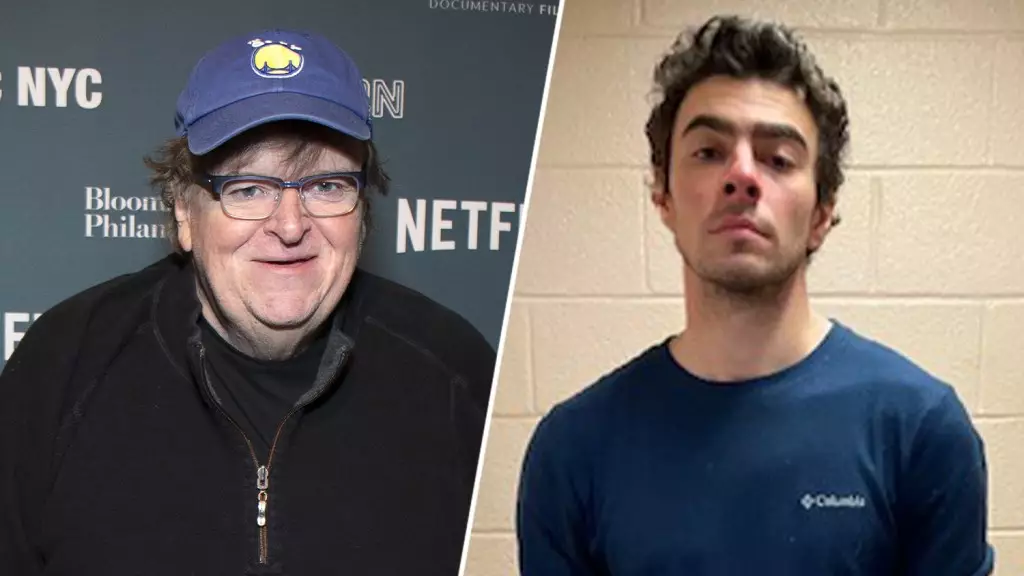In the wake of a high-profile murder within the corporate healthcare sector, a complex dialogue has emerged about the intersection of wealth, accountability, and public sentiment toward the for-profit healthcare model in the United States. The assassination of UnitedHealthcare CEO Brian Thompson has not only sparked outrage but has also led to intense scrutiny of an industry that many believe is failing the very populace it is supposed to serve. Following the arrest of the prime suspect, Luigi Mangione, renowned filmmaker Michael Moore has stepped into the fray with powerful implications about the nature of this anger, its roots, and its validity. Moore’s open letter serves as both a condemnation of murder and a clarion call for a broader examination of healthcare inequities.
Moore begins by addressing the profound feelings of rage that have erupted in response to Thompson’s death, arguing convincingly that such emotions are wholly justified. He recounts a surge of emotional turmoil spilling over the media landscape, compelling numerous voices to request a reaction to the tragic event. By illuminating the frustrations around the for-profit healthcare system, Moore acknowledges the pent-up distress that has been accumulating over years of medical debt, denied claims, and inadequate care. His assertion that “the anger is 1000% justified” resonates powerfully in a society where many struggle under the weight of medical costs that can lead to bankruptcies and deteriorated mental health conditions.
This anger, as he articulates, is not simply directed at one individual’s demise but rather symbolizes a larger struggle against an industry that has long been seen as exploitative. It is a visceral response not merely to the loss of a CEO but to what he frames as an epidemic of suffering tied to healthcare inaccessibility. In drawing connections between individual tragedies and systemic failures, Moore challenges readers to consider the implications of what he describes as a “mass death and misery” caused by the actions of the healthcare industry.
While many commentators might be quick to vilify Mangione for his actions, Moore makes it clear that the conversation should not rest solely on this tragedy. He distinguishes between condemnation of violence and acknowledgment of systemic injustices. By labeling the act as “RICH ON RICH crime,” he critiques the socioeconomic dynamics at play, pointing out that Mangione hails from a privileged background. This essential context reframes the narrative, nudging it away from sensationalism and towards a critical evaluating of how wealth and power function within the harsh realities of healthcare.
Moore’s assertion that “no one needs to die” crystallizes a crucial moral imperative that should underpin discussions about healthcare reform. It begs the question: why does a financial system dictate who lives or dies? The implications here extend beyond just healthcare—what does it say about our societal values when access to life-saving treatments is determined by a profit motive?
In his letter, Moore takes the opportunity to provoke an urgent call to action for audiences and policymakers alike. By referencing his earlier documentary “Sicko,” he underscores the consistent narrative of exploitation within the current healthcare system. The documentary serves as both an exposé and a rallying cry for reform, providing deeper insights into the extents and limits of the healthcare system in America.
The juxtaposition of anger with a call to action is powerful. It motivates viewers to not only absorb the gravity of the current situation but also to advocate for change. Moore emphasizes that healing cannot come from violence; instead, it comes from transparency and reform that prioritizes human well-being over corporate profit. If the industry continues to thrive on a model that favors financial gain over care, the cycle of anger and despair will persist.
Thus, as the dust settles in the aftermath of a tragic event, we are left with more than just questions of murder and culpability; we are compelled to re-evaluate our healthcare system and the lived experiences of so many. Moore’s letter is a grounding reminder of the interconnectedness of societal anger and systemic failure, offering a poignant invitation to move from outrage to action. By fostering an environment where these essential conversations can thrive, there lies an opportunity to cultivate a healthcare landscape that truly serves the people rather than profits—the real challenge we face in the 21st century.


Leave a Reply